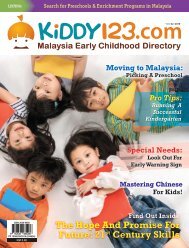all pages
Create successful ePaper yourself
Turn your PDF publications into a flip-book with our unique Google optimized e-Paper software.
Education<br />
With the accelerating pace of change, these critical skills empower<br />
children to secure information-age jobs, survive ch<strong>all</strong>enges of<br />
a highly uncertain future and protect themselves in unfiltered<br />
environments.<br />
21st Century Skills<br />
The increasingly globalized world has prompted us, as parents,<br />
educators and researchers, to redefine the traditional notion<br />
of which skills are required to prepare children for success in<br />
life outside of school. We need to move beyond the common<br />
formulations of learning that the majority of us grew up with and<br />
it takes more than just computer and technological skills to face<br />
the increasingly competitive society. The diagram below illustrates<br />
the top skills that children need to embrace:<br />
Learning Skills<br />
Crical Thinking<br />
Creave Thinking<br />
Collaborave<br />
Communicaon<br />
Literacy Skills<br />
Informaon Literacy<br />
Media Literacy<br />
Technology Literacy<br />
Life Skills<br />
Flexibility<br />
Leadership<br />
Iniave<br />
Producvity<br />
Social<br />
How Are Educators Adapting?<br />
Early education plays a crucial role in this. It requires redesigning<br />
of education systems and curricula, and retraining educators to<br />
encourage flexibility rather than specialization. In our efforts<br />
to help parents make informed educational decisions, we have<br />
observed a sharp increase in the number of local schools being<br />
strong advocates of 21st century education. They favour childcentred<br />
teaching methods, for example, project-based learning<br />
and problem-based learning, to inculcate critical thinking, creative<br />
thinking, communication and collaborative skills in the children.<br />
Instead of memorizing facts through rote learning, there is strong<br />
emphasis on teaching children how to learn and how to solve<br />
problems. The learning experiences strive to break down the<br />
barriers that exist between education and the real world, making<br />
them more relevant. The implementation of these practices c<strong>all</strong>s<br />
for an iterative process of planning, teacher’s training, execution<br />
and evaluation.<br />
A Need to Reimagine Education<br />
Curricula, assessments, teacher expertise, and management<br />
have f<strong>all</strong>en short of its goals in past education reform efforts.<br />
Acknowledging and making changes to the key components that<br />
have undermined the success of the reform movement is our best<br />
hope for turning our education system into one that is in line<br />
with the 21st century skills movement, and hopefully benefit lessadvantaged<br />
children as well. Fixing these would not be easy, but it<br />
is doable over time.<br />
4 Kiddy123 VOL 02



